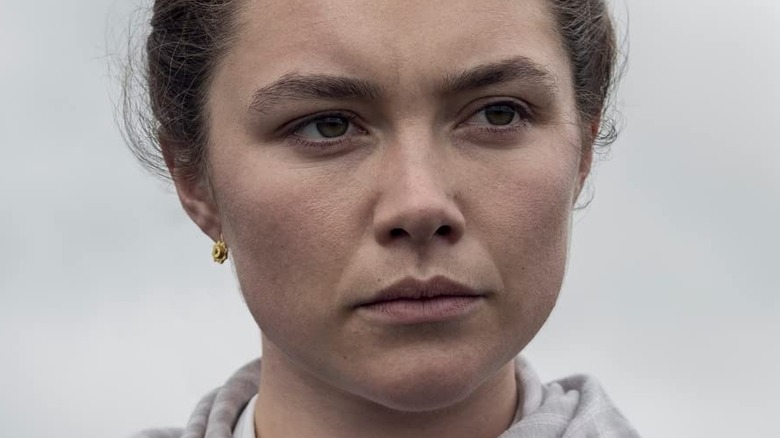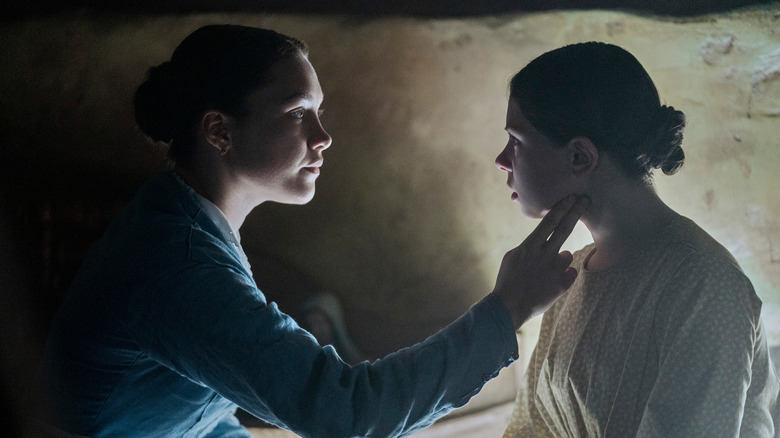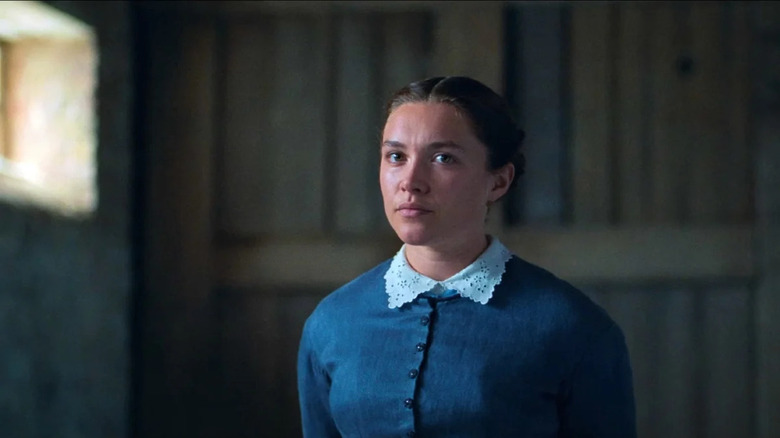The Wonder Review: A Thrillingly Wonderful Period Piece
- A haunting period tale, which feels eerily relevant
- Terrific performances from the entire cast
- A distracting meta framing device, which gets in the way of the drama
"The Wonder" is very self-aware of the fact that it is more insightful as an allegory for the modern day, rather than as a window into the past. The latest film from Chilean director Sebastián Lelio — which premiered at London Film Festival and was adapted from the 2016 novel of the same name by "Room" author Emma Donoghue — opens with a striking, fourth-wall-breaking monologue informing us that what we're about to see is a fictional story, the camera tracking across disused sets in a film studio in a manner that initially recalls Lars Von Trier's "Dogville."
This isn't a comparison based purely on aesthetics, either; as we move back into 19th-century Ireland and the story officially begins, what unfolds is another tale of female oppression on the behalf of a backward society refusing to change — one that may be considerably less abrasive than Trier's 2003 opus, but no less bleak.
A story about stories
The framing device utilized for Lelio's film is both its most ingenious stroke and its biggest weakness. A significant departure from the source material, this meta flourish helps to further underline the central thesis, pinning the fictional nature of the film alongside its central narrative, a nurse's quest to find truth in a place where everybody has chosen the comfort of fantasy over logic. Both Lelio and Donoghue have spoken about how the film feels more relevant in a world devastated by COVID, where the forces of science have had to contend with conspiracy theory — something which is only further highlighted by these momentary glimpses out of the drama, back into the modern world. However, this device isn't particularly necessary for the film to feel prescient and only serves to distract from the haunting Gothic tale. Instead of unpacking the many rich themes and performances in "The Wonder," you may likely find that this stylistic choice is the only thing that lingers on the mind afterward, for all the wrong reasons.
After the first meta monologue, we are thrown back into 19th-century Ireland, where English nurse Lib Wright (Florence Pugh) has traveled after being informed of an extraordinary case in a rural village nestled deep in the country's midlands. Word has spread internationally that 11-year-old Anna O'Donnell (newcomer Kíla Lord Cassidy) has not eaten for several months, and has managed to stay alive and healthy, albeit bedridden. Lib has been called on to observe her daily routine and to get to the bottom of this supposed miracle which the town elders (led by Toby Jones and Ciarán Hinds) want to capitalize on, taking eight-hour shifts at her bedside that she will share with a nun — so experts in both science and faith can help the town find a reason for what is going on. Initially skeptical about the case, Lib soon finds that the truth is much stranger than fiction, even if it does require her to start believing in the fantastical tale in front of her to start uncovering it.
As you can probably guess from that synopsis, "The Wonder" isn't a film that needs an elaborate visual metaphor in the form of the framing device to underline just how relevant the story has become. Although rooted in the Victorian-era phenomenon of fasting girls, acknowledging how these children came to be seen in a light akin to religious deities despite their suffering, Lelio's film is at its richest when analyzed as a contemporary tale about the conflicts between science and faith — the idea that cycles of fanaticism keep repeating themselves, even if their central cause changes. Released into a "post-truth" world, you could easily interpret "The Wonder" as a metaphor for various culture war causes de celebre, where the most impassioned voices are always the ones arguing against logic and reason. But it's hard to escape the specter of COVID as the film's central allegorical concern, with the film succeeding as the first major dramatic work to successfully untangle the ways in which many people rejected the wisdom of science to forge their own narratives while refraining from making any all-too-obvious parallels with the modern day (the awkward framing device notwithstanding).
Seeing is believing
"The Wonder" succeeds largely due to how Florence Pugh's Lib functions as an audience surrogate, initially baffled and cynical, before an increasing obsession leads to her believing in something there's no logical or rational explanation for. It's a trajectory we've seen play out in the real-world countless times in recent years — we all know somebody who has transformed into a conspiracy theorist after a trip down a social media rabbit hole — but here, it's explored with genuine empathy and intrigue, laying out the causes as to why we could find ourselves believing in the irrational. Lib's immersion into the titular wonder is designed to mirror of our own, proving surprisingly effective at making us suspend all disbelief to take in the miracle in front of our eyes. It certainly helps that she is by far the most resistant character on screen (with the possible exception of Tom Burke's Daily Telegraph journalist, who has made his way to Ireland to report on the case), her initial cynicism and detachment designed to mirror that of the audience, which only makes it all the more effective once initial preconceptions are shattered.
Pugh's terrific performance, her finest leading turn since her 2016 breakout "Lady Macbeth," is similarly pitched at an initial icy remove. In the hands of Lelio, however, this detachment only proves inviting — Lib Wright is as much of an enigma at first glance as the mysterious case study she's come to supervise, another seemingly unknowable piece of this well-crafted puzzle. However, none of this is to say that "The Wonder" is the kind of glacially paced arthouse fare designed to keep the audience firmly away from anything approaching emotional engagement. It's a film that engages via unpacking the human need to imagine the existence of something greater than ourselves and the danger that comes from blindly following miracles. Once you've broken through the icy exterior, and if you can get past the distracting meta-framing device, there's plenty to reward you here.


